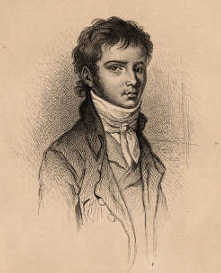![]()
AGE 27 - 28 [1798]
Compiled by Gary D. Evans
|
Last Updated:
March 25, 2019 7:00 PM
|
 |
|
WORKS CREATED
| Op 9: Trios #1, 2, 3 | Completed early in the year under publication contract for March 16th. |
| Op 10#3: Piano Sonata #7 in D [grand] | Composed early in the year. "The pictured soul-state of a melancholy being" [L.Dec pg125]. Ded to Countess Browne. |
| Op 11: Trio for clarinet, cello and piano | |
| Op 12: 3 Violin Sonatas: Violin Sonata#1 in D, Violin Sonata#2 in A, Violin Sonata#3 in E | |
| Op 13: Piano Sonata #8 in c "Pathetique" | (1st pub.12/1799) (Beethoven instructed Ries to add a few notes to Rondo before publication; this was unusual for him [Wegeler/Ries p94]) |
| Op 14#1: Piano Sonata #9 in E | (less dramatic) (4-7 w/ 1st sketches 1795) |
| Op 15: Piano Concerto #1 in C | Piano Concerto #2 was actually written 1st. (1st sketches1795.) (pub 1801) |
| Op 18: Writing of 6 st. quartets | [large project] Begun in August with most of the work done over the next 2 years (1799-1800). (This group of 6 was patterned after Haydn demonstrating his competency in emulation.) (Writing order: 3,1,2,5,4,6 w/ last 3 more expansive & inventive) (#1 Adagio: Burial vault scene: R.& Juliet) |
| Op 19: 2nd concerto revised, | written out Sept-Oct. (B. felt this was not his best work in a letter to his publisher referring to op15 & op19) |
| Op 20: Septet begun | (completed 1800). (Piano arr. of op38) |
| Op 51#2: Rondo in G | |
| Op 129: Rondo a capriccio "Die wut uber den verlornen groschen" | |
| WoO 29: March in Bb | (see Hess 107) |
| WoO 121: Song "Abschiedsgesang an Wiens Burger" | |
| WoO 125: Song, "La tiranna" | (1st attempt @ English text) |
| WoO 127: Song, "Neue Liebe, neues Leben" | |
| WoO 128: Song, "Plaisir d'aimer" | |
| WoO 205a: "Baron, Baron, Baron" | (musical quip in letter to Zmeskall #29) |
| Hess 28: Second Trio to the Scherzo for String Trio op 9 #1 | |
| Hess 36: String Quartet arr. of the Fugue from overture to Handel's Solomon | |
| Hess 66: Allegretto in C Minor | (Unheard Beethoven - mp3 link here) |
| Hess 87: Piano arr. of March in Bb (WoO 29) for 6 wind instruments | |
| Hess 139: Song, "Minnesold von Burger, in Tonen an Amenda ausbezahlt | (lost) |
Not Classified: Song, "Meine Lebenszeit Verstreicht" in g |
(lost) |
BIOGRAPHICAL NOTES
|
DATE
|
|
|
Early
|
Compositions early in the year: Piano Sonatas op10 (completed), Trios op9 (under contract for pub. March 16), Trio op11; Violin Sonatas op12. |
|
Feb 5
|
General Bernadotte, Emissary of the French Directoroire, arrived in Vienna. |
|
Early
|
General Bernadotte along w/ several others, including violinist Rodolphe Kreutzer suggested to B. that he compose a "heroic" symphony to theme of General Bonaparte. [Kerman p23] |
|
Spring
|
Kreutzer had been in Vienna in the spring of 1798 and was described in an 1804 Beethoven letter [Anderson#99] as "…a dear kind fellow who during his stay in Vienna gave me a great deal of pleasure." In that 1804 letter he continued that his 1803 Violin Sonata, Opus 47 was to be dedicated to Kreutzer. |
|
Mar 29
|
Beethoven and Schuppanzigh performed a Violin Sonata (possibly from op12). |
|
Apr 10
|
Lenz von Breuning died in Bonn at age 21. |
|
Apr-July
|
Piano Sonata op14#1 composed |
|
July 21
|
Publication announcement for Trios, op9 |
|
July-Aug
|
First use of sketchbooks rather than single leaves of paper. |
|
Aug
|
Quartets op18 begun |
|
Sept-Oct
|
2nd Piano Concerto revised with new score written. |
|
Sept 22
|
Publication announcement for Cello Variations, op66 |
|
Sept 26
|
Publication announcement for Piano Sonatas, op10 |
|
?
|
1st reported humming, whistling sounds & fear of progressive hearing loss. |
|
Oct 3
|
Publication announcement for Trios, op11 (First issue of Leipzig Allgemeine Musikalische Zeitung with Rocklitz editor.) |
|
Oct
|
Left for Prague-two successful concerts & a private recital (Piano concertos 1 and 2 performed). |
|
Oct 27
|
B. performed a piano concerto in Vienna. (#1 and/or #2?) |
|
Dec
|
Violin Sonatas, op12 published. |
| Met and became friends with Karl Amenda. Amenda was first employed as a precentor by Princess Karoliine Lobkowitz, but soon became the private teacher of Mozart's children. | |
|
?
|
Several playful letters sent to Zmeskall - exact dates unknown - (Anderson#26), Anderson#27), Anderson#28), Anderson#29) |
|
?
|
Another playful letter sent to Zmeskall regarding Zmeskall "moral outlook." Beethoven answered it with his own:: "Power is the moral principle of those who excel others, and it is also mine." (Anderson#30) |
![]()